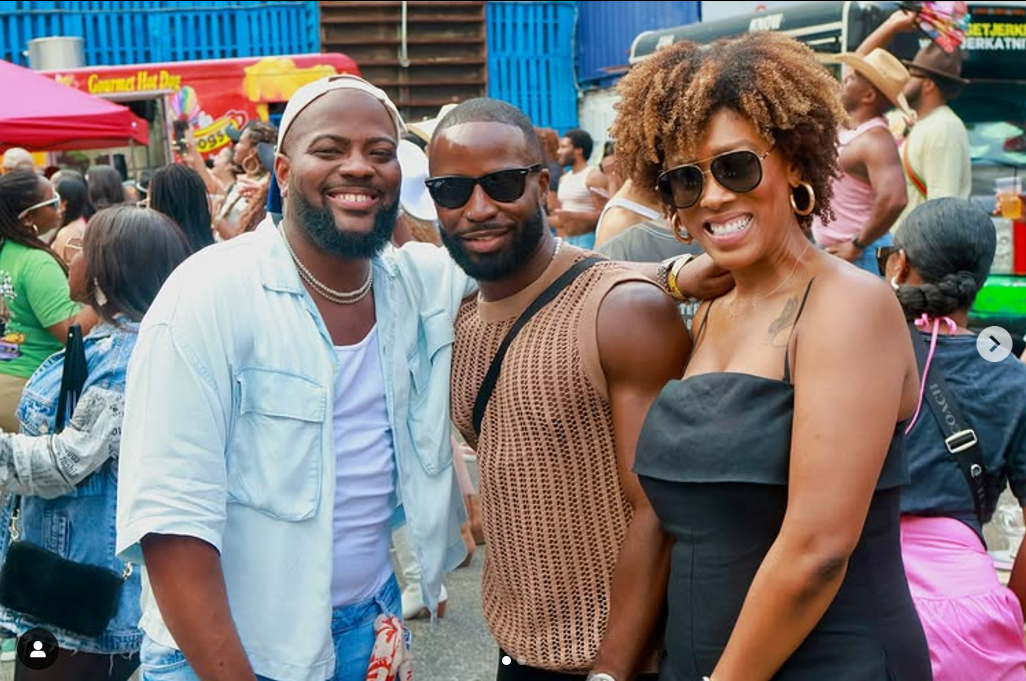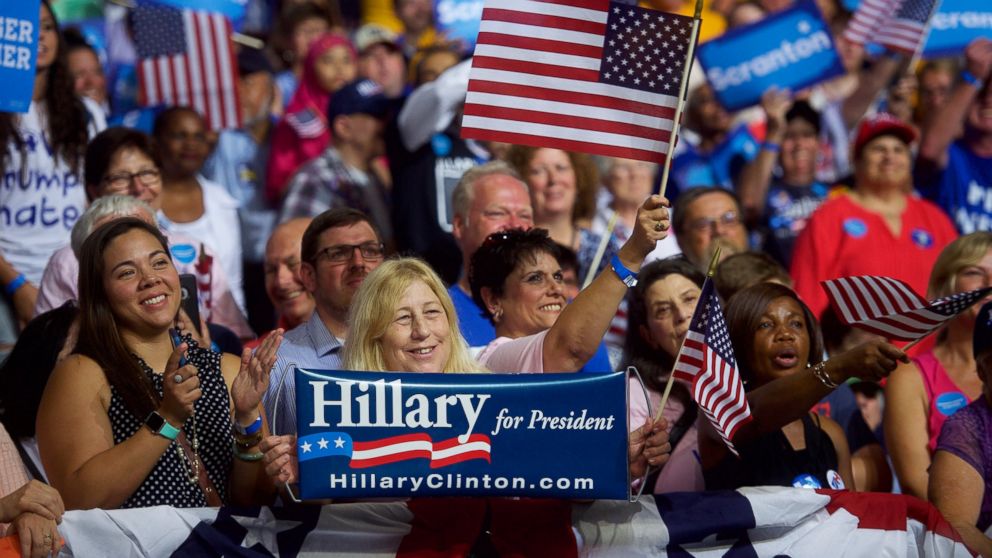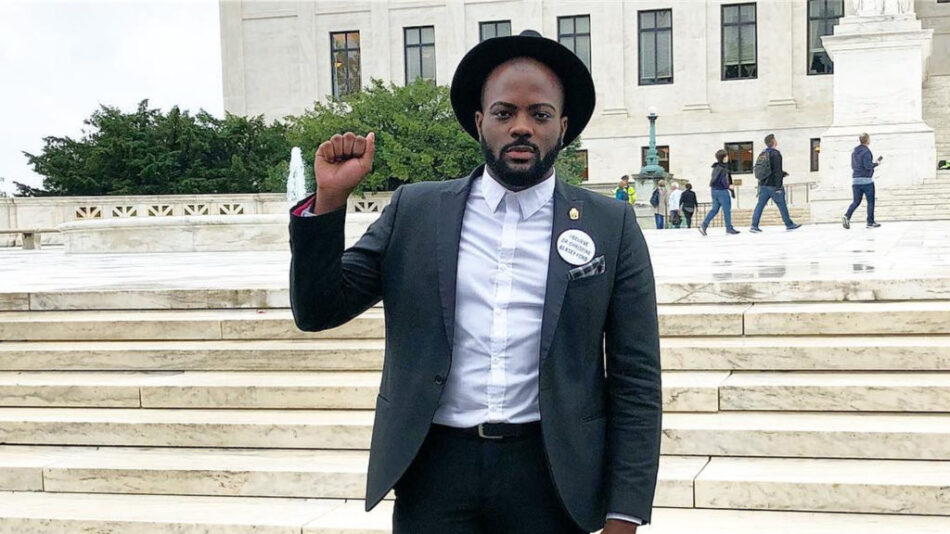Preston Mitchum did not know a life without poverty until he reached adulthood.
Born and raised in Youngstown, Ohio, Michtum said hard work did not guarantee financial stability for his household, which included him, his two sisters and their mother.
“We grew up in a very blue collar environment where people work really hard, but they never really saw the benefits of that hard work,” said Mitchum, now a 38-year-old lawyer and social activist in the Washington, D.C. area.
“Most of my family is still experiencing that. I still send money home,” he added.
Mitchum said this life experience is one of many factors that shapes his perspective on politics. The other considerations are how comfortably he’s able to not only live, but thrive as a Black, queer, survivor of sexual assault. He said that it largely comes down to whether Democrats or Republicans are in power and who voted them into office. Mitchum himself is a Democrat and voted for Vice President Kamala Harris in the 2024 election.
President-elect Donald J. Trump won in a landslide, largely because of a surge of non-Black voters supporting him. Black men and Black women backed him at 21% and 7%, respectively, according to NBC News exit polling. Trump won 60% of white men, 53% of white women, 54% of Latino men, 39% of Latino women and 47% of all other races, the exit polls found.
The percentage gaps between how Black people voted and how other racial minorities voted has infuriated some Black Harris supporters, who took to X, formerly Twitter, in the hours after Trump won on Nov. 5 to disavow Black Indigenous People Of Color (BIPOC) and people of color (POC) language. The phrase “person of color” refers to someone who is not white.
“Yesterday also displays why we should stop with POC and BIPOC when discussing Black people. It often feels very much Black versus others,” Mitchum wrote on X the morning after the election.
“That’s why I reject that POC stuff HARD. I am not a POC. I am Black. Two totally different things. Too many POCs want to be white,” user Brittany wrote.
“This election has me feeling very ‘I’m black, not POC,’” another user said.
“Black folks have allowed themselves to be lumped in with others who don’t have their best interest in mind. The community has to stop falling for this play & stick together,” a fourth user said.
Mitchum said in an interview that separating from the language has been overdue.
“I don’t know if I believe Black people should have ever claimed those terms in the first place,” he said. “I believe that a lot of those terms were not created for Black people and a lot of it was done for ease of categorization, but without real consequences or discussion of who is often seen as the most marginalized within those marginalizations.”
The history behind ‘BIPOC’ and ‘POC’
The acronyms “BIPOC” and “POC” have separate but connected histories.
The first documented use of BIPOC was in 2001 — with a lowercase “i”— to mean a bisexual person, or people, of color, according to a copy of a dictionary that supplemented the May 2021 edition of Among the New Words obtained by Pavement Pieces. Among the New Words is a quarterly dictionary and linguistics article about American language use published in the journal American Speech by Duke University Press. Defining the term as variations of Black, Indigenous and people of color was first documented in 2013, the dictionary said.
Kelly Wright, the lead editor for Among the New Words, said the term emerged in Canada after a group of Black, Indigenous and people of color musicians banded together to fight for institutional representation and funding in the music industry. When her team added BIPOC to their dictionary in 2021, she said “there was not really a consensus around what it meant, which groups it gathers and who it represents.”
“In some ways, the term serves institutions and white people to be able to say all of these non-white people in a way that doesn’t sound like all of these non-white people,” said Wright, a race and language professor at the University of Wisconsin-Madison. “And so in a lot of ways, that term others more than it includes. Something was going to tip the scale lexically to make this conversation come forward, and it’s been bubbling up since the beginning.
“The results of the election seems to be the straw that broke the camel’s back,” Wright added.
The term “BIPOC” built on “POC,” an acronym for phrases “people of color” and “person of color” that dates back to the late 1700s. At the time, it described Black people, those of mixed racial ancestry and Indigenous people in some cases, according to a 2022 article published in the Cambridge University Press. Use of the phrase had ended by the mid-19th century, but it reemerged in the 1970s, according to the article.
“When the category ‘people of color’ was revived in the late twentieth century, it took on an enlarged scope and significance,” the article said, adding that the phrase did not previously include Asian or Mexican people because they were on the Western and Southwestern parts of the country, respectively, while Black and Indigenous people were in the other parts of the country.
“Dispersed in regional enclaves, they did not affiliate organizationally with one another or with Blacks and Indigenous people, and whites did not see them as members of one collective group,” the article said.
But now less isolated, Wright said expanding the definition to its present day meaning quickly names multiple groups of people largely for governmental purposes.
“People of color feels like an institutional term. Blackness lives everywhere. It’s very much outside the institution as well as inside it,” she said.
“Part of the reason why Black people specifically are wanting to separate themselves from that POC term is because they feel like they have a very different history. It’s a cultural identity as much as it is a racial identity or a social identity,” she added, referencing how one of the first things free Black people in Africa and enslaved people in the U.S. did was name their offspring, towns and buildings.
“That tradition lives everyday,” she said.
Mitchum added that the recent election results show why a catch-all grouping can be problematic.
“I think voting this past year, actually the past several, is probably one of the better examples of what Black folks oftentimes consider ourselves and how we will be impacted by other folks,” he said.
Separating from the language extends to distancing from the people, too

Preston Mitchum with his friends over the summer. (Courtesy of Preston Mitchum.)
Mitchum said his friend group is almost exclusively all Black. He currently stars in Bravo TV’s “Summer House: Martha’s Vineyard,” a reality show featuring an all-Black cast.
“My circles of folks truly are Black folks because that’s just who I’ve always felt closer to,” he said. “That’s the people who are always – never felt like I was playing myself.”
He is weary of talking to people who voted for Trump.
“This person who caused so much harm to everyone else around you and you don’t care, to me, there’s already an impasse,” he said.
“I tend to withdraw to protect my peace because there isn’t really an opportunity to build. Maybe in the years to come there will be. But as of right now, if you’re talking to someone who treats money and capitalism as more important than abortion access, marriage equality, there’s nothing to really discuss in my opinion,” Mitchum added.
Alyssa Bonde, a 22-year-old caretaker for senior citizens in Garden Grove, California, who voted for Trump, sees refusing to be friends with someone because of how they voted as a form of discrimination and immaturity. Bonde, who is Middle Eastern, said her best friend of 12 years, Andrew, who is Black, ended their friendship because she voted for Trump.
“He already knew that I was going to be voting for Trump,” said Bonde. “But, when Trump actually won, he started ignoring me for two weeks. I finally just called him out … and then he explains it’s because I voted against his rights.”
Bonde declined to provide Andrew’s last name or contact information. Pavement Pieces was unable to identify or contact him without Bonde’s help.
Bonde said Andrew receives government assistance to supplement the income he makes from his job and that’s where they differ politically.
“His thinking is he’s going to stop getting free money,” she said. “I voted against his rights because I don’t believe in people getting handouts.”
Bonde said she wasn’t sure if they would reconcile after having a heated exchange about it weeks ago.
“It just kind of depends on if he wants to grow up and stop being a child about things and be an adult,” she said.
Bonde said another one of her friends also had a friendship end over voting for Trump, and that this has been a big conversation in X’s Republican threads.
“I’m shocked how so many of my Democrats’ friends on Facebook are giving ultimatums based on Tuesday’s election. ‘If you voted for Trump, we’re no longer friends.’ It’s childish,” one X user wrote on Nov. 7.
“If you’re willing to end 14 years of friendship over how someone voted, you’re unhinged and were never a true friend,” another said.
“What kind of friendship is built upon your friend only doing what ‘you expect?’” a third questioned.
This whole “if you voted for trump/conservative we’re not friends anymore” take is so childish. An outright refusal to listen to not the politicians, but the people they represent and hear what’s pissing them off.
Dismissive, short sighted and foolish.— Antoine (@AntoineDem44549) November 7, 2024
When asked specifically about the betrayal Black Harris supporters feel regarding other racial minorities voting for Trump, Bonde said she thinks the press frames Trump’s policies as “racist.”
“I wish you couldn’t just go on TMZ and see that Trump’s a racist because he wants to put up the border. No, he wants to do that, because thousands of people are using our government checks and just riding off them and not working, and it’s crippling us,” she said.
Bonde added that her grocery bill has increased due to inflation and she cannot afford health insurance, so she is on California’s version of coverage provided under the Affordable Care Act.
Trump wants the Act repealed, and Bonde does, too.
“He’s lowering everything else that I would actually be able to afford health insurance,” she said, referring to his proposed tax cuts.
“I don’t believe in people getting handouts. I think people should work and pay their dues,” she added.
Mitchum disagrees, saying steady income from hard work alone has not led to economic prosperity for his family.
“This idea that if you work hard to make it is just palpable false,” he said. “Whenever I hear this rhetoric, I switch back on it so heavily because tell my family members that, who I’ve seen do everything in their power to make it. Zero of them have.”
Rejecting ‘POC’ language largely didn’t occur on X in 2020 or 2016

Hillary Clinton supporters react to her speech during a rally with Vice President Joe Biden at Riverfront Sports athletic facility, on Aug. 15, 2016, in Scranton, Pa. (Courtesy of Mark Makela / Getty Images.)
While some friendships ended over Trump votes in 2020 and 2016, swaths of Black Democrats did not run to X, then-Twitter, following the elections to disavow POC language.
Disconnecting from the group language now is because of the “demographics of who voted for him,” Wright said, referencing the exit polling for each election.
“It makes sense why this term is part of the site of that discussion because language and identity are linked,” she said.
Trump winning over non-Black racial minority voters peaked this year after two election cycles of less success in this area.
In 2016, 13% of Black men and 4% of Black women voted for him while 32% of Latino men, 25% of Latino women and 31% of all other races backed him, according to CNN exit polling at the time. In 2020, 19% of Black men and 9% of Black women supported Trump’s candidacy while 36% of Latino men, 30% of Latino women and 38% of all other races voted for him, according to ABC News polling at the time. Trump saw double-digit gains this year in the majority of these voting blocks except for with Black men and women in comparison to the last two elections. He only jumped by nine percentage points for Latino women and all other races in 2020.
The gains were largely because of Trump’s proposed tax cuts and economic plan, and the growing discontent with inflation under the Biden administration. Voters then turned to Trump for economic relief.
“The reality is for a lot of people, they are thinking about that paycheck,” said Jared Loggins, a professor of Black studies and political science at Amherst College in Massachusetts.
Loggins said voters remembered when they received stimulus checks under Trump’s first presidency and haven’t recently felt the same type of direct economic relief under Biden, who also continued stimulus checks when he took office. Congress passed the CARES Act to allocate the initial funds and Trump signed it into law. Biden’s funds were provided under the American Rescue Plan, which Congress passed and he signed.
“There is the expectation that the government is supposed to do this consistently over and over again,” Loggins said. “That all gets slowly — during the Biden administration — all those COVID policies essentially die in the cradle. So you have this really kind of difficult situation where people are connecting Trump to their well being during this crisis.”
What does cross-racial solidarity look like under a second Trump presidency?

There’s no clear path toward solidarity under a second Trump presidency. (Courtesy of the American Psychological Association.)
Bonde said a solution to friendships ending over how the involved parties voted is to not share the information.
“I think politics should totally be out of friendships,” she said. “There’s some things that you just don’t bring into a friendship.”
She said outside of friendships, it’s possible for Republicans and Democrats across the country to exchange daily interactions.
“It just takes maturity. Sometimes people don’t have it in them to be mature,” she said.
Wright said one way to close the divisive gap that has reemerged is to “transcend identity categories” by proposing unifying measures, such as initiatives for housing or healthcare.
“What I would like to see is let’s maybe not talk about who this is for,” she said. “These kind of things should be for everyone.”



